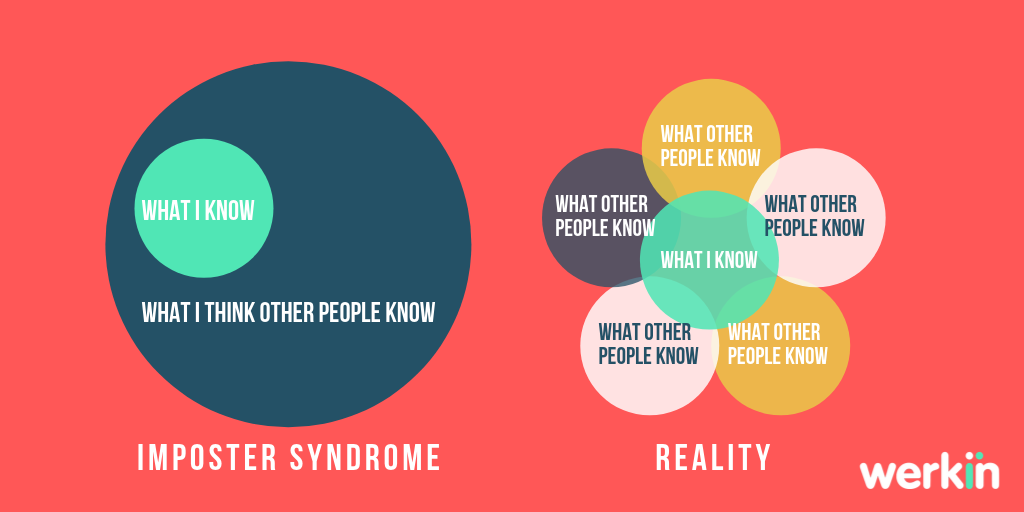Why Imposter Syndrome is One of the Most Epic Battles We Fight Within Ourselves
You will never climb Career Mountain and get to the top and shout, “I made it!” You will rarely feel done or complete or even successful. Most people I know struggle with that complicated soup of feeling slighted on one hand and like a total fraud on the other.
— Amy Poehler, cool mom from Mean Girls

Imposter Syndrome is constantly feeling like the life you’ve created for yourself is somehow not yours to claim. Somehow, because you’re a brilliant mastermind evil genius, you’ve managed to keep up this ruse to everyone around you (besides yourself) that you are worthy and deserving of happiness and success. Incredible. Officially, it’s known as a collection of feelings of inadequacy that persist despite evident success.
At least you’re in great company. Amy Poehler grapples with feeling like a fraud every time someone quotes from her Emmy-winning show Parks and Rec. Neil Armstrong, in the midst of other accomplished artists and scientists, said “I just look at all these people, and I think, what the heck am I doing here? They’ve made amazing things. I just went where I was sent.” Granted, he was the very first man on the moon and the most lauded astronaut in human history but who cares, he feels like he was just sent there. Even Lady Gaga is in on this charade, saying, “I still sometimes feel like a loser kid in high school and I just have to pick myself up and tell myself that I’m a superstar every morning so that I can get through this day and be for my fans what they need me to be.” Hate to break it to you Miss Gaga, but your Grammys, your millions of adoring fans, and your iconic catalog of heartbreaking and empowering anthems don’t hold up against all the high schoolers who bullied you.
As unfathomable as it is to look at these people and think they feel any of the self-doubt we feel, the truth is, imposter syndrome is an equalizer. When the disease was theorized by Pauline Rose Clance and Suzanne Imes in 1978, they concluded that it was particularly intense among high achieving women. It’s a well-guarded secret, a hidden companion, that loses its power the more we speak about it. Achievements are clearly not enough to combat this insidious self-concept because it requires a more internal power of good.

Power tips:
Observe, recognize, but do not engage
Self-awareness is always important but also one of the strongest in your arsenal against imposter syndrome. Journaling these negative emotions will probably force you to confront how little reality there is to them. Reflection is powerful because it allows you to explore a new perspective just by distancing yourself just by writing it down and pushing it out of the spiral of your mind. Counter negative thoughts with positive statements or neutralize them with affirmations. Separate your tangible accomplishments from the feelings of inadequacy, because, in the end, they are just feelings and can be manipulated and adapted to serve you. Instead of engaging, observe, and think about them critically, “Is this thought hindering or helping me?”. Don’t allow a moment of weakness to define your whole character, learn ways to talk yourself down from the ledge, and realize your doubt doesn’t have to control your actions, and can just be fleeting.
Act in confidence
Ask for help. There are particular strains of imposter syndrome known as the soloist and the expert who find it difficult to reach out to others in times of need for fear of being unmasked as the fraud they are. Most success is collaborative and internalizing that truth will allow you to start seeking the support that everyone needs to progress.
Group therapy is a space in which women can allow themselves to be vulnerable and realize they are not alone in these struggles. Witnessing the ways other women invalidate themselves and how far removed their perception is from their actual accomplishments acts almost as a mirror for yourself. A Gestalt technique that therapists found helpful involves having “client role-play the opposite of “I’m not bright,” i.e., to have her act out being bright, feeling it and expressing it. She can then work through the fears and guilt that accompany the fantasy of specialness and can move toward a realistic and self-affirming view of her own abilities, neither overestimating nor underestimating them. This role-play helps some women confront their fears of success. In taking the stance of being bright and capable, many women experience a rewarding sense of their personal power. If, as is often the case, they receive applause from other group members for such self-affirmation, their fears about acknowledging their brightness begin to subside.”
Reframe your thoughts on failure
Mistakes are not failures, and many argue that the concept of failure does not exist because of the sheer permanence the world implies. Avoiding failure means not taking risks, waiting for some perfect version of yourself to appear before you take on relationships and roles that you’ve dreamed about. There will never be a perfect time or version of you, so you need to start pushing yourself beyond this cloud of doubt and realize that all of everything is a constant learning experience. Overcome perfectionism with this knowledge so you don’t feel this daunting pressure before even beginning the journey.
We know what’s underneath matters to you. At our core, we are a women’s empowerment company that stands for strong values and principles. Ten percent of every order of our comfortable, body-celebrating seamless underwear, bralettes, shapewear, and masks fund Microfinance loans for female entrepreneurs around the world. That’s also why all seamless products on our site are made at manufacturing plants under the Women’s Empowerment Principles developed by the United Nations. That means your panties are made ethically: no sweatshops, and no fast fashion. Learn more about our mission and our products.



